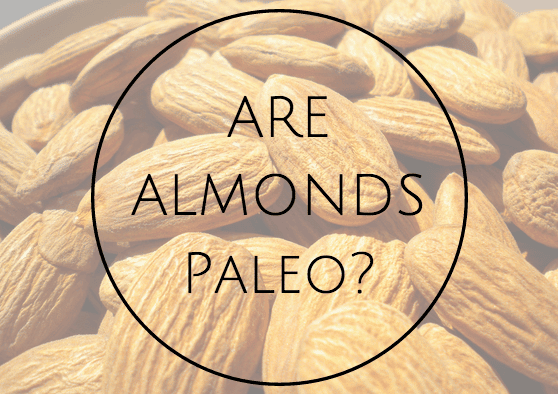Table of Contents
The Quick Answer
Yes. Almonds are paleo.
Why Are Almonds Paleo?
Almonds are high in vital minerals and vitamins like riboflavin, magnesium, copper, vitamin E and manganese. They’re also one of the few foods that are alkaline. Alkaline foods are important because hyperacidicity can increase your risk of immune dysfunction, insulin imbalance, biochemical abnormalities, and osteoporosis. Most biological processes and dietary choices promote acidity, so almonds can play an important role by keeping your pH levels neutral.
Research suggests that almonds improve memory function and delay the onset of dementia, Alzheimer’s disease, and other degenerative disorders. This is because of the high concentration of antioxidants contained in almonds.
There is also evidence to suggest that eating almonds may reduce your risk of developing cancer. Paul Davis conducted a study in which he gave rats almonds as well as cancer-causing chemicals. He concluded that “almond consumption may reduce colon cancer risk and does so via at least one almond lipid-associated component.” (2)
Recommendations
Store almonds in an airtight container, ideally in a fridge, because polyunsaturated fatty acids are vulnerable to change when exposed to air and light. Oxidized polyunsaturated fatty acids can react in our bodies and cause chronic health issues.
Raw almonds are a much better choice than nut butters and almond flour. This is mainly because the ideal recommended dose of almonds is one ounce per day or one handful of almonds. However, one cup of almond flour is equivalent to over ninety almonds. You can also use almond oil to get all the health benefits of almonds without exposing yourself to anti-nutrients.
Why Is There Confusion?
Like all other nuts and legumes, almonds contain high quantities of phytic acid – an anti-nutrient that impairs the absorption of minerals like zinc, calcium, and iron. Almonds are also rich in polyunsaturated fat, especially omega-6.
However, you can get rid of phytic acid by soaking almonds in salt water overnight. Make sure to remove the skin before you consume them, since most of the phytate in nuts is concentrated in the skin and the outer layer. You can also reduce the anti-nutrient content using dehydration, by exposing the nuts to bright sunlight for a few hours or by using a microwave or dehydrator.
So, Are Almonds Paleo?
Yes, almonds are paleo. They contain vitamins and minerals that your body needs and they may even help to prevent illnesses such as cancer and Alzheimer’s disease. That said, you should consume them in moderation and soak them overnight to get rid of the phytic acid they contain.
How To Know What Is And Isn’t Paleo
Check out Paleo.io, the mobile app that answers the question, “is __ paleo?”. Paleo.io comes with the most comprehensive paleo diet food list out there, so no matter which food you’re confused about, you’ll always be able to find out whether or not it’s paleo.
References
- Barbro, N., Brittmarie, S., & ÅKE, C. (1985). Reduction of the phytate content of bran by leavening in bread and its effect on zinc absorption in man. British Journal of Nutrition, 53(01), 47-53.
- Davis, P. A., & Iwahashi, C. K. (2001). Whole almonds and almond fractions reduce aberrant crypt foci in a rat model of colon carcinogenesis. Cancer letters, 165(1), 27-33.
Photo credit: HealthAliciousNess
